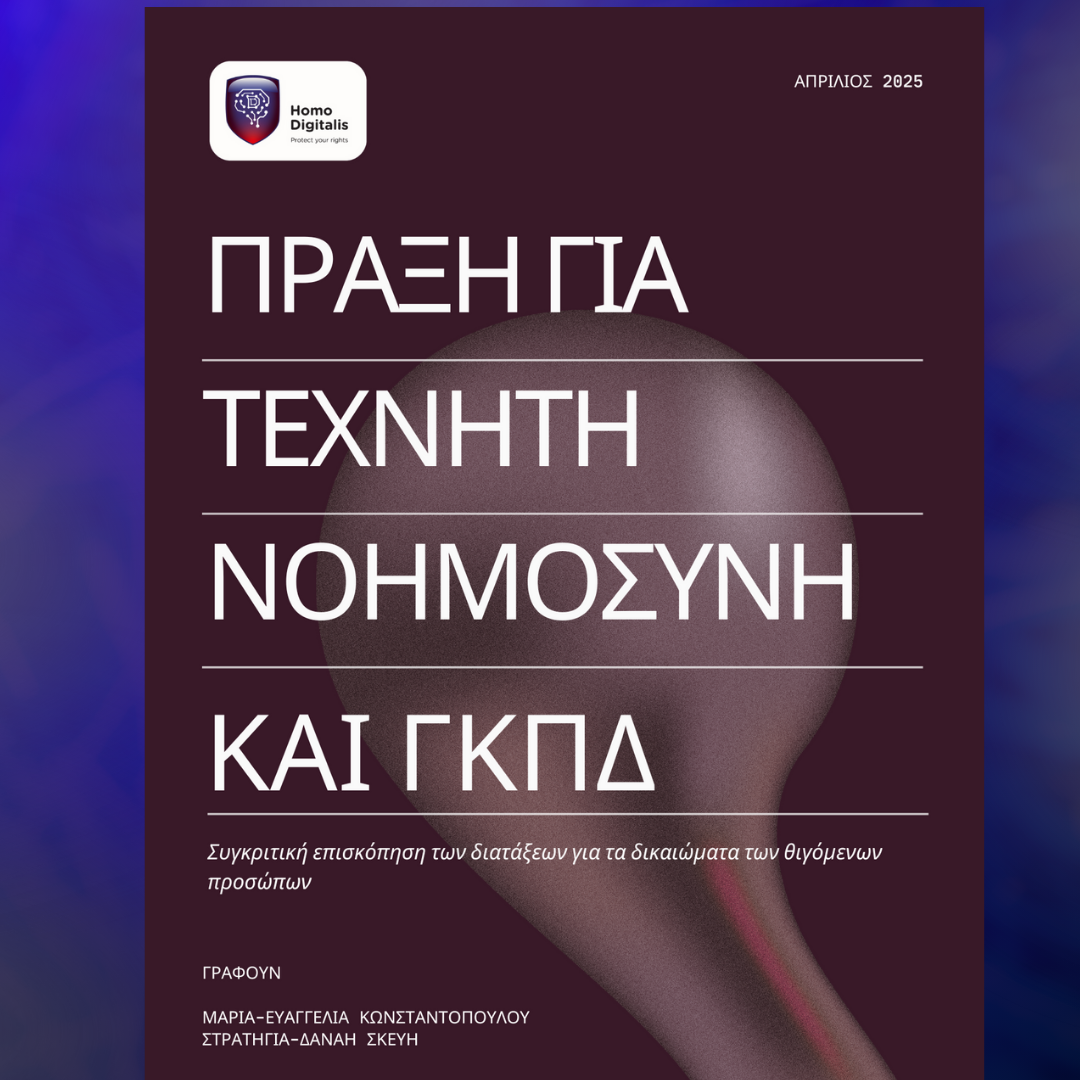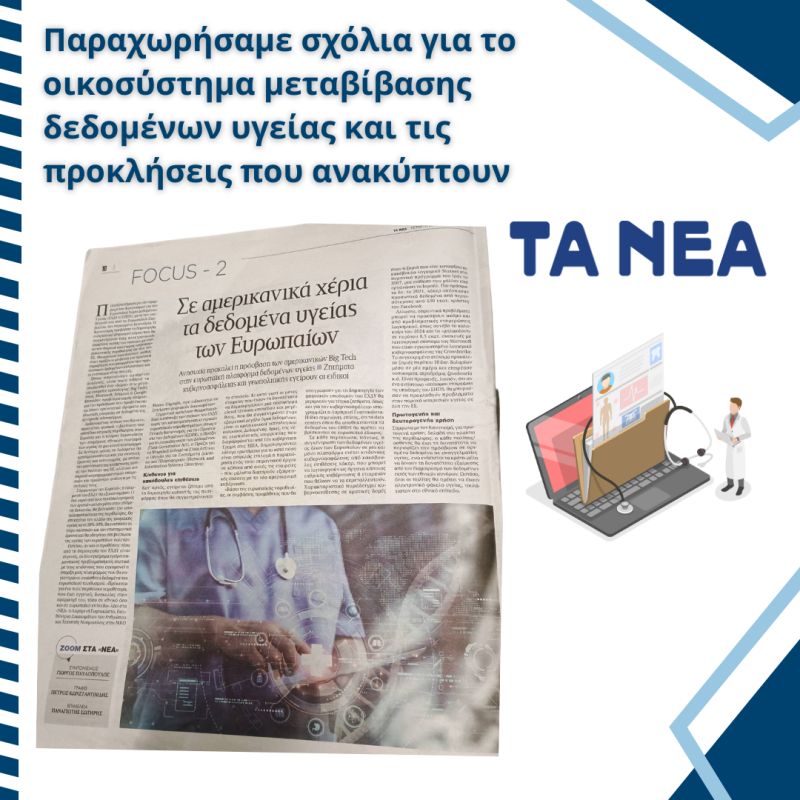Homo Digitalis is featured in Adessium's Annual Report for 2024
Adessium supports the European AI & Society Fund (EAISF), a pooled fund dedicated to achieving responsible AI policies and applications. The fund works on legislation for artificial intelligence, monitors its social impact and reports potential risks, such as unjust consequences for citizens and environmental damage due to technology.
In this context, Homo Digitalis alongside European Digital Rights were featured in the 2024 Annual Report, highlighting our key achievements and ongoing work made possible through the support of EAISF. The report includes quotes from Claire Fernandez and Eleftherios Chelioudakis.
We warmly thank EAISF and Adessium for the opportunity to showcase our impactful work in the field of border management and law enforcement, as well as for their continuous support in safeguarding human rights in the digital age!
Read their full annual report and the important work they support here.
We call the Greek DPA to temporarily block the inclusion of the Personal Number on new ID cards until the necessary risk mitigation measures are implemented!
Since June, the Hellenic Police (EL.AS.) has been issuing ID cards that display the Personal Number (P.A). for citizens who already have one. As of tomorrow, June 28, 2025, it will no longer issue an ID card to any citizen who is eligible for a P.A. but has not yet completed the required issuance process.
In its Opinion 1/2025, the Hellenic Data Protection Authority (HDPA) states that displaying the P.A. on ID cards poses risks and must therefore be accompanied by specific mitigation measures.
However, despite the fact that the Greek State proposed certain measures to the HDPA, which were approved as appropriate, it has failed to implement them, thereby exposing citizens to severe risks of identity theft.
For example, one of the proposed measures was the adoption of legal provisions prohibiting private entities from keeping photocopies of ID cards. This legislative step must be paired with coordinated and intensive public awareness campaigns to ensure that citizens know they should not allow copies of their physical ID to be retained.
At the end of its analysis, the HDPA concludes that, since the risks associated with including the P.A. on ID cards remain, once a sufficient period has passed during which mitigation measures are applied and public authorities are equipped with the necessary tools for digital reading of the P.A., the display will no longer be necessary and the obligation to display the P.A. on the ID card should be lifted.
For these reasons, on Friday, June 20, we submitted a formal request (Ref. No. Γ/ΕΙΣ/5621/20-06-2025), urging the HDPA to exercise its powers under Article 58(2)(f) of the GDPR, and impose a temporary restriction on processing, by prohibiting the display of the P.A. on ID cards until the essential mitigation measures are properly in place to address the significant risks arising from this practice.
Our request is available here (only in EL).
Schools in Messinia at the Heart of Digital Awareness
From March 31 to May 7, the NGO Homo Digitalis visited 11 primary and secondary schools across Messinia, bringing education and awareness on internet safety closer to students.
During the workshops held in Arfara, Dorio, Eva, Thouria, Kalamata, Kyparissia, Pylos, Filiatra, Finikounda, and Chora, a total of 554 students engaged with key issues of the digital world, such as: cyberbullying, online safety, recognition and understanding of deepfakes, and responsible use of social media.
Raising awareness and informing both children and adults is a vital step toward a safe and healthy experience in the digital space.
The initiative was supported by the “Captain Vassilis and Carmen Constantakopoulos” Foundation and it will continue with new sessions from September to December 2025.
If your school is located in Messinia and would like to host these free educational sessions, please contact the Homo Digitalis team at info@homodigitalis.gr.
Our Joint Action with Reporters United & Vouliwatch: The Cameras at the Polytechnic Threaten Personal Data
On March 29, 2025, the National Technical University of Athens (NTUA) installed surveillance cameras at the Zografou Campus and the Patission Complex without informing the public about its data processing policy for students and staff.
On May 26, 2025, Vouliwatch, Reporters United, and Homo Digitalis jointly submitted a Freedom of Information (FOI) Request to determine whether NTUA complies with the law, the General Data Protection Regulation (GDPR), and other national regulations. A similar request was also submitted by 61 Architecture students.
NTUA may not be fully complying with Articles 12, 13, 35, and 36 of the GDPR, which ensure transparent information for data subjects, data protection impact assessments, and the obligation of prior consultation.
In our request, we explain that NTUA has not responded to student and staff inquiries about how their personal data is being processed, and we request access to the government’s confidential security plan for universities.
In our request to NTUA, we also seek to know who is being recorded by the cameras, where their data is stored, and whether this data is being shared with the Hellenic Police (ELAS).
NTUA has a deadline to respond to our request by June 15, and to the students’ request by June 19. We will continue to monitor the issue and will follow up with further reporting. Our organizations’ FOI request and information provision document is available here.
Article 77 of the AI Act: 6 months after the designation of the Fundamental Rights Authorities
On the first official deadline set by the Artificial Intelligence Regulation (AI Act), it required member states to appoint one or more authorities in accordance with Article 77 for the protection of fundamental rights by November 2, 2024.
Today, May 2, 2025 — six months after the deadline — 25 out of the 27 European countries have appointed a total of 210 authorities, a number that seems staggering and at the same time sends a strong message about how seriously these countries take the issue of fundamental rights. But does it reflect reality?
With this brief study, we aim to provide answers to the following questions:
What is the purpose of Article 77 of the AI Regulation?
Which authorities have been appointed by the member states to date?
What powers does the AI Regulation actually grant to these regulatory authorities, and what obligations arise from Article 78 of the AI Regulation regarding the confidentiality of information?
Who are the four national authorities that have taken on this role, what are their existing and new powers under the AI Regulation?
Through a case study, our Director on Fundamental Rights and AI, Lamprini Gyftokosta, attempts to explore how these authorities will cooperate, while also raising some questions that will undoubtedly concern us over time.
You can read our study here (EL).
We publish our 4th Study on the AI ACT – Comparative overview of the provisions on the rights of affected individuals
Today, April 11, 2025, Homo Digitalis publishes its fourth study on the provisions of Regulation 2024/1689 on Artificial Intelligence (AI), widely known as the AI Act.
This study focuses on the right to explanation and the right of individuals not to be subject to automated decision-making.
Specifically, the use of artificial intelligence systems for making automated decisions is continuously expanding in both the public and private sectors, with significant impacts on the individuals subjected to them.
Therefore, this study examines the legal remedies available to individuals affected by decisions made through the use of AI. The analysis focuses on the right to an explanation of individual decision-making as provided in Article 86 of Regulation 2024/1689. However, since the protection of affected individuals is not limited solely to these provisions, the analysis extends to the right to contest individual decision-making, which—under appropriate interpretation—is based on Article 22 of Regulation 2016/679, known as the GDPR.
The study’s authors are two distinguished legal professionals and volunteer members of Homo Digitalis: Maria-Evangelia Konstantopoulou and Stratygia-Danai Skevi (listed alphabetically).
You can read our 4th study here.
We remind you that we have published three previous studies on Regulation 2024/1689 and its transposition into the Greek legal order: in October (impact assessment on fundamental rights), November (AI governance and competent supervisory authorities), and December (prohibited practices) of 2024, respectively.
This intensive effort aims to contribute constructively to the public dialogue in Greece and at the EU level in the field of artificial intelligence, and it is the result of significant support from the European Artificial Intelligence & Society Fund.
Interview of Homo Digitalis in the newspaper "TA NEA" on the ΕHDS
On the occasion of the entry into force of the provisions of Regulation 2025/327 regarding the European Health Data Space (EHDS), journalist Petros Konstantinidis and the newspaper TA NEA published an article highlighting the concerns surrounding the access of American Big Tech companies to the European health data platform.
What are the cybersecurity and geopolitical issues that arise?
Our team was represented by Lamprini Gyftokosta, who provided relevant comments, which you can read in the online version of the article available here.
We thank the journalist for his interest in our work.
The provisions of Regulation 2025/327 will come into effect on March 26, 2027, and will be of significant concern in the near future.
Homo Digitalis Interview on NAFTEMPORIKI TV’s "REVIEW" with Takis Spiliopoulos
Yesterday evening, Homo Digitalis was featured on NAFTEMPORIKI TV’s show “REVIEW”, hosted by journalist Takis Spiliopoulos.
Representing our team, Eleftherios Chelioudakis participated in an engaging discussion about our work in public awareness and policy shaping.
Key Discussion Points
–Targeted commercial advertising and its ethical implications
–Addiction to digital platforms
–AI legislation and its impact on society
NGI TALER – Privacy-Focused Digital Payments
We also discussed NGI – The Next Generation Internet and its open funding calls under NGI TALER, a European Commission co-funded initiative aimed at developing a privacy-focused digital payment platform using open-source principles.
(Interested applicants can apply here)
Other Featured Guests
The episode also included insightful discussions with:
–Antonis Ballis, Assistant Professor of Financial Technology, on cash and digital transactions
–Dimitris Papastergiou, Minister of Digital Governance, on the future of digital policy
A huge thank you to NAFTEMPORIKI TV, Takis Spiliopoulos, and the entire journalistic team, including Liana Thanou, for the kind invitation and the opportunity to share our work.
Watch the full interview here.








